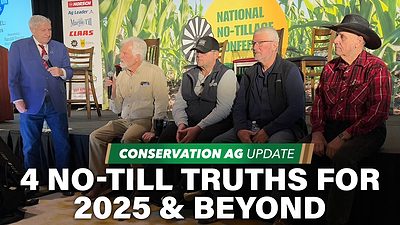The EPA has renewed registration for two herbicides that had faced elimination over concerns about their environmental impact.
The agency approved renewals for Enlist Duo and Enlist One — both manufactured by Delaware-based Corteva Agriscience — Tuesday. The new registration will last for seven years and comes with changes to the labelling to limit environmental impacts caused by their active ingredients: 2,4-D and glyphosate.
Both ingredients risk some environmental hazard, the Agency said in a statement. The renewal had prompted an ecological re-evaluation for both chemicals.
“EPA's ecological assessment found direct risks to non-listed and listed plants from pesticide runoff (i.e., pesticide carried off the application site following rainfall or irrigation) and risks to animals that rely on these affected plants for diet or habitat, including non-listed and listed animals and some designated critical habitats,” the statement reads in part. “EPA’s ecological assessment also found direct effects to bees and listed species that use corn, cotton, and soybean fields for diet and/or habitat.”
As a result, the agency is implementing the following label changes:
- Growers can no longer apply the products within 48 hours of expected rainfall when soil is water-saturated.
- Irrigation is prohibited within 48 hours of application of either product.
- Growers are required to employ runoff reduction measures from an agency-approved list.
- Growers must limit Enlist application when crops are in bloom to avoid risks to pollinators like honeybees.
- Requiring Corteva to develop and provide mandatory education and training emphasizing the importance of pollinators like the monarch butterfly.
The agency is also expanding a full ban on using the Enlist products in “counties where EPA identified risks to on-field listed species that use corn, cotton or soybean fields for diet and/or habitat.”
The original labeling for the products banned use in some counties in Arizona, Arkansas, Florida, Kansas, Massachusetts, Missouri, Nebraska, Ohio, Oklahoma, Rhode Island, South Dakota, Tennessee and Texas.
The expanded ban adds counties in some of those states and expands partial or total bans of either product to counties in Colorado, Georgia, Louisiana, Minnesota, New York, Pennsylvania, and South Carolina.
A full list of counties is available on the EPA website.
The agency expects the ban to have minimal impact.
“EPA does not expect this measure to disrupt the use of Enlist products for most American farmers—the counties where use will be prohibited by these new measures represents approximately 3% of corn acres, 8% of cotton acres, and 2% of soybean acres nationally,” the statement reads.
The list of selected runoff mitigation measures varies according to the hydrologic soil group a field resides in. Each measure has a credit value, and users must select a number of measures that add up to a set credit value.
For example, using no-till, strip-till, ridge-till and mulch till measures is worth 4 credits, the highest listed single-measure credit value. Planting a cover crop is worth 2 credits.
Farmers working soil with sand content can do less (4 credits of mitigation value) than farmers working soils with silt and clay (6 credits of mitigation value).
Corteva issued a statement welcoming the changes.
“These updates will help ensure that the use of Enlist herbicides in accordance with the label will help protect endangered species and their habitats while also allowing growers to continue to capture the benefits of the Enlist weed control system,” the statement reads in part.






